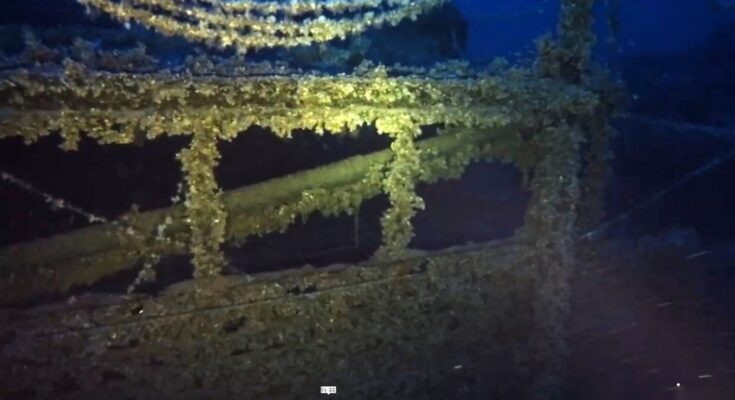The wreck of the British ocean liner Arcadian which was sunk by a U-boat in 1917 was discovered near the island of Sifnos, Greece.
On 15 April 1917 Arcadian was en route from Thessaloniki to Alexandria with a company of 1,335 troops and crew and escorted by an Imperial Japanese Navy destroyer.
Shortly after completing a boat drill, while south of the Greek island of Sifnos, Arcadian was hit by a single torpedo from the German submarine SM UC-74 and sank within six minutes with the loss of 279 lives.
A contemporary newspaper article described how four of Arcadian’s overcrowded lifeboats were successfully lowered before she sank. Some of the dead were cooks and stokers who were working below decks.
Wreck of Arcadian discovered in Greece
The wreck was discovered 107 years later in the Aegean by the research team of Kostas Thoktaridis at a depth of 163 meters.
“The quality of the primary metals used in the construction of the Arcadian has certainly played an important role in the preservation of the wreck to this day,” Kostas Thoktaridis told the Athens Macedonia News Agency (AMNA).
“It appears that the bow of the Arcadian initially landed on the bottom of the Aegean, with the result that the deformations of the plates are visible. Due to the length of the ship (152.4 m) and the depth of the sea area which is only 163 meters, the bow thrust helped to align the hull on the bottom,” he added.

Largest dedicated cruise ship in the world at the time
The ship was launched in the UK in 1899 by Vickers, Sons & Maxim Ltd for the Pacific Steam Navigation Company as Ortona. She was renamed Arcadian when the Royal Mail Steam Packet Company acquired her in 1906.
She started her first world cruise in January 1912, the largest dedicated cruise ship in the world at that time. She was chartered for the Royal Navy in 1915.

Among those who survived the sinking was crew member Thomas Threlfall. The astonishing fact about this man from Liverpool is that he was also aboard the Titanic and survived its sinking on 15 April 1912. He was rescued in boat 14.
He later stated: “It was the same day of the week, and the same date of the month that the Titanic went down … and I have come safely out of both affairs…”
Challenged to what was the worse of the two experiences he stated:
“Well, the Titanic stopped afloat for a couple of hours and we had time to turn around, but of course you could not live in the water that night. This time we had calm sea and warm weather, and you had a chance, but with the Titanic you died in the water almost as soon as you got in.”



